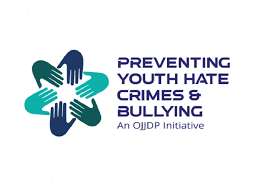Introduction
This curriculum is part of the Office of Juvenile Justice and Delinquency Prevention’s (OJJDP’s) initiative to prevent youth hate crimes and identity-based bullying. Operating from a youthbased lens that focuses on prevention and early intervention, this multipronged initiative is designed to:
- Increase awareness of youth hate crimes and bias-based bullying.
- Identify best practices and evidence-based strategies to build protective factors in youth, and help youth resist digital hate and disengage from violent extremist hate groups.
- Ensure youth have a voice on the topic of hate crimes and an opportunity for partners to work meaningfully with and for young people.
- Provide tools to grantees, interested communities, and the field at large to change the attitudes and behavior of at-risk youth and young people who commit hate-crime offenses.
GOALS OF THE CURRICULUM
Youth will:
- Define, describe, and identify identity-based bullying, hate incidents, hate crimes, and radicalization.
- Examine their own beliefs and attitudes about bias, prejudice, and bias-motivated hate.
- Explore the value of inclusion and diverse perspectives with other youth and those in their communities.
- Increase critical thinking skills in understanding and assessing the role of contributing factors, such as social media and learned prejudice, in perpetuating hate crimes.
- Increase their resiliency and internal protective factors to reject and resist biased attitudes and beliefs in themselves and others.
- Develop safe and effective skills and motivation to take positive action and become allies of those who are targets of bias, bullying, hate, and other forms of oppression.
THE STRUCTURE OF THE CURRICULUM
This curriculum is composed of the following 10 units:
- Unit 1. The Respectful Community, Part 1: Creating a Vision provides today’s youth with an opportunity to create a clear vision of what a respectful community would look like and become active participants in creating a respectful community.
- Unit 2. Understanding Bias, Prejudice, Bullying, and Hate builds understanding of some working definitions relating to bias, prejudice, bullying, and hate; introduces the concepts of personal and institutional manifestations of prejudice and the differences between them; and presents information about the common behaviors that are typically present when incidents of bullying occur.
- Unit 3. Everyday Prejudice and You builds young people’s awareness of some of their own unconscious biases and the influence of their thinking and behavior, and increases their understanding of the value of diverse perspectives and the tendency of hate to escalate when no one takes action to intervene.
- Unit 4. Conflict and Communication provides opportunities for youth to develop and practice new effective skills in communication and managing conflict, skills that are vital for success in every area where young people’s futures may lead them.
- Unit 5. Identity and Bullying increases understanding of the characteristics of bullying and the impact when bullying is motivated by the identity of the person or group being targeted, including race, ethnicity, religion, or other differences. The lessons provide opportunities to better understand the benefits and outcomes of personal choices and opportunities to develop skills as allies to those targeted by bullying.
- Unit 6. Crime and Punishment builds understanding of hate crime laws, the basic categories of general crime, the distinction between standard criminal behavior and crimes that are motivated by bias and hate, and some of the criteria used to determine if crimes are motivated by hate.
- Unit 7. Media Literacy builds increased awareness of the current climate of misinformation, motivates youth to assess the reliability and trustworthiness of the online and offline media they encounter, and mobilizes their skills to both respond safely and effectively to digital media, but also to use their voices to create media themselves that promote respect and civility.
- Unit 8. Violent Extremism and Youth provides a process to identify personal values as tools to counter hate and builds understanding of the kinds of prejudice at the root of violent extremist ideology. The lessons help youth increase their awareness of the ways computer algorithms may lead young people down paths of violent extremism and conspiracy thinking and learn some effective response skills to resist violent extremist ideologies and recruitment efforts.
- Unit 9. Cyberhate and Counterspeech addresses the impact of hate speech and behaviors in young people’s own communities and in the broader society, builds their understanding about cyberhate and the ways it manifests, and equips them to respond using strategies to counter online hate while still staying safe.
- Unit 10. The Respectful Community, Part 2: Creating Change provides young people with knowledge, skills, and motivation to take actions, both individually and as a group, that contribute to making their communities and their world a civil and respectful place for all.

